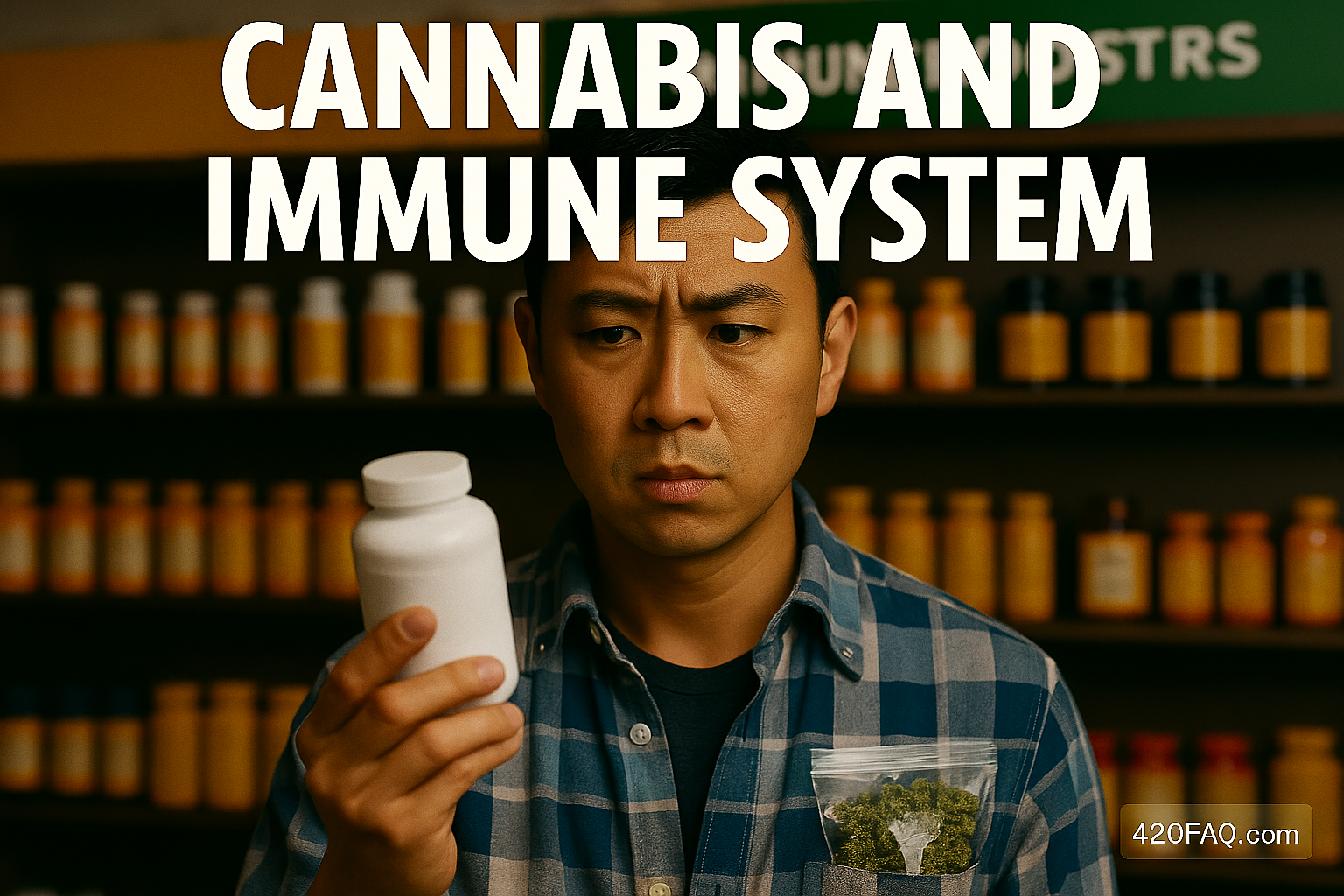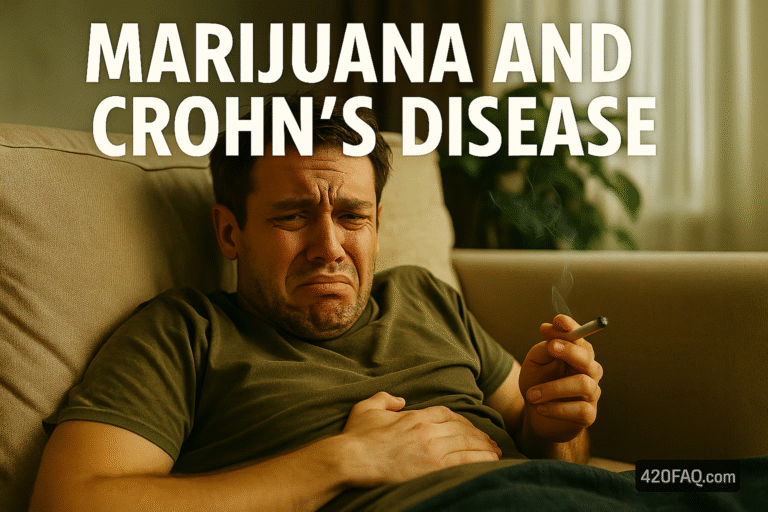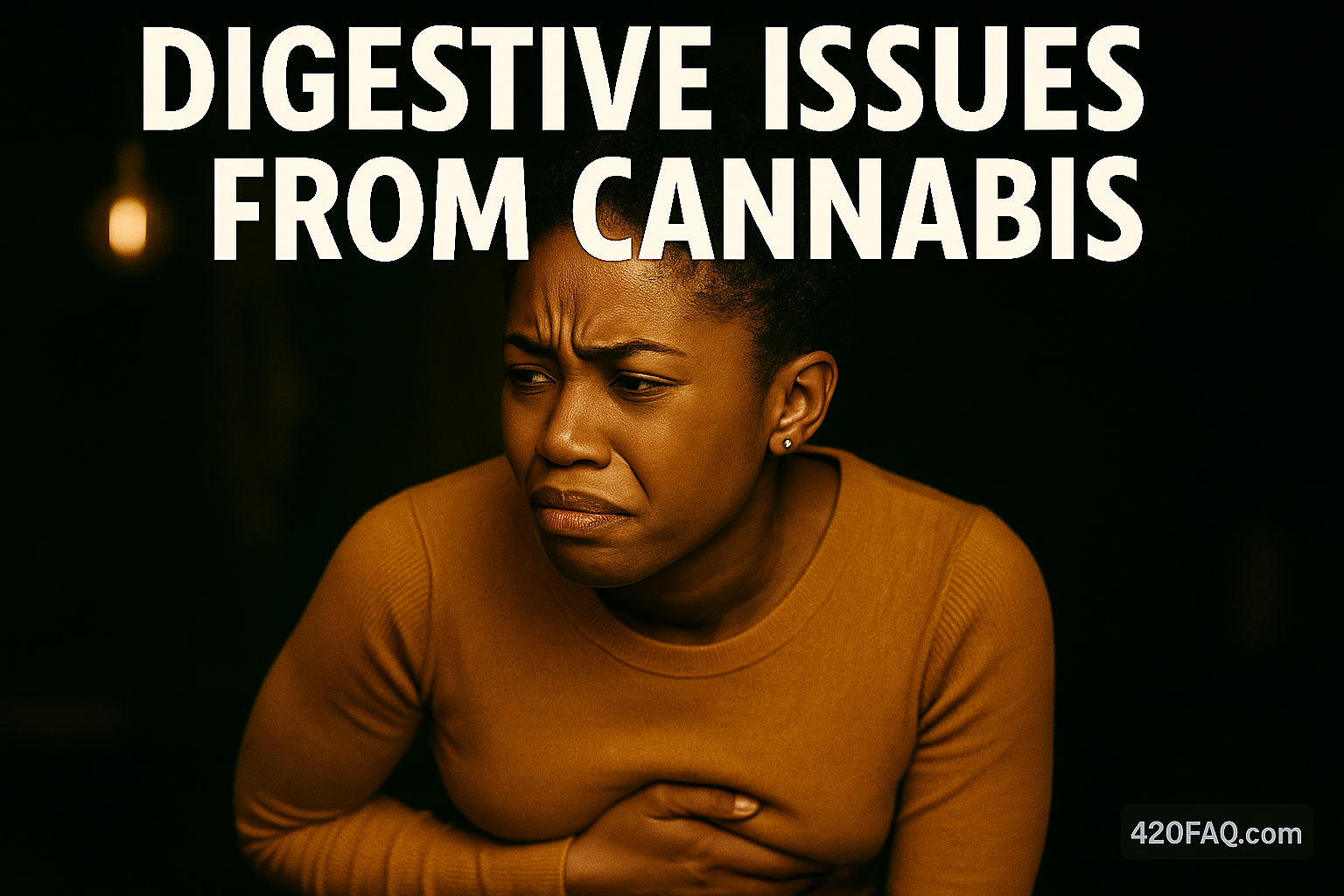
Cannabis and the Immune System: Comprehensive Guide to Effects, Risks, and Potential Benefits
Understanding how cannabis interacts with the immune system means mapping two complex networks that constantly talk to each other: your immune machinery (innate and adaptive defenses) and the endocannabinoid system (ECS), a signaling web built around the body’s own cannabinoids (anandamide and 2-AG) and their receptors (CB1, CB2). This guide explains what researchers know (and don’t know) about cannabinoids like THC and CBD, how they modulate immune cells and cytokines, where the evidence suggests potential benefit, where risks may hide, and how dose, frequency, and route of use matter.
Endocannabinoid System 101: Where Immunity Meets Cannabinoid Signaling
The ECS sits upstream of many immune decisions. CB1 receptors dominate in the central nervous system, while CB2 receptors are abundant on immune cells (T and B lymphocytes, macrophages, dendritic cells, microglia). Your body’s endocannabinoids rise and fall in response to stress, infection, or tissue damage. Phytocannabinoids (THC, CBD, and dozens of minor compounds) can nudge—or shove—these same switches. In general terms, CB2 activation tends to be immunomodulatory (often anti-inflammatory), while context, dose, and cell type determine the direction and magnitude of effect.
How THC and CBD Influence Immune Cells and Cytokines
THC is a partial agonist at CB1/CB2 and can down-shift certain pro-inflammatory signals. Studies show THC can suppress or reshape cytokine profiles (for example, reducing IL-2, IFN-γ in some T-cell settings and modulating IL-1 family signaling in others), sometimes pushing responses toward a less inflammatory state. CBD, which has low affinity for CB1/CB2 but acts through TRPV1, PPAR-γ, adenosine, and other targets, is frequently characterized as anti-inflammatory and anti-oxidative in vitro and in vivo models. Neither compound is universally “immune-suppressive” or “immune-boosting”—effects are conditional on dose, timing, cell type, disease state, and delivery route. For approachable overviews, see The Effects of Cannabis on Your Body and a clinic summary of THC–IL-1 interactions in Understanding How THC Affects the Immune System.
Innate vs. Adaptive Immunity: Nuanced Modulation, Not One-Direction “Boosting”
Innate immunity (neutrophils, macrophages, NK cells) handles first response. Adaptive immunity (T and B cells) crafts targeted attacks and memory. Cannabinoids can dampen hyper-inflammation (valuable in some settings) yet potentially blunt aspects of pathogen clearance if over-suppressed. Examples from model systems include: reduced macrophage activation and altered antigen presentation; T-cell proliferation changes; shifts in Th1/Th2/Th17/Treg balance; and modulation of antibody production. Translation from bench to bedside is still developing.
Clinical Contexts: Where Signals Look Promising—and Where Caution Fits
Auto-inflammatory and autoimmune conditions (e.g., inflammatory bowel disease, rheumatoid arthritis, psoriasis, multiple sclerosis) are logical targets because excessive inflammation drives damage. Observational studies and small trials suggest cannabinoids may ease pain, spasticity, sleep disruption, and subjective inflammatory symptoms, while mechanistic work shows down-regulation of certain cytokines and microglial activation. Yet large, long-duration randomized trials with hard inflammatory endpoints remain sparse. In contrast, during acute infections, strong immune suppression would be undesirable—especially at high doses. The upshot: cannabis may help turn down “too-hot” immune settings but could be a poor companion when you need maximal antimicrobial punch.
Dose, Frequency, and Route of Administration Matter
Low to moderate intermittent doses may produce different immune signatures than chronic high-dose use. Inhalation delivers rapid CNS and systemic effects; oral cannabinoids produce slower, longer curves and different metabolite profiles (e.g., 11-OH-THC). Topicals tend to be local. Edibles with high THC taken regularly may tilt more strongly toward immunosuppression than occasional low-dose CBD-dominant products. Individual variability (genetics, microbiome, concurrent meds) further shifts outcomes.
Respiratory Tract and Mucosal Immunity
Combustion products from smoking irritate airways and can impair mucociliary function and local immune defenses, which may raise susceptibility to some respiratory infections or chronic bronchitic symptoms. Vaporization reduces but does not eliminate airway exposure to irritants. Non-inhaled routes (tinctures, capsules) bypass lung mucosa entirely and may be preferable for people with respiratory or immune vulnerabilities.
THC vs. CBD: Different Levers, Overlapping Nets
• THC: psychoactive; can reduce certain pro-inflammatory cytokines; may suppress T-cell proliferation in some contexts; dose-dependent effects on NK cells and macrophages; psychoactive side effects and dependency risk with heavy use. • CBD: non-intoxicating; broadly anti-inflammatory in preclinical models; engages non-CB receptors and transcription factors (e.g., PPAR-γ) relevant to oxidative stress and cytokine regulation; fewer abuse-liability concerns but still pharmacologically active and capable of drug–drug interactions. Net effect for a given person and condition is the vector sum of cannabinoids, terpenes, dose, route, frequency, and biology.
Drug Interactions, Vaccines, and Special Populations
Cannabinoids can interact with CYP450 enzymes (notably CYP3A4 and CYP2C9), impacting levels of immuno-active medications (e.g., certain calcineurin inhibitors, mTOR inhibitors, steroids, biologics). People on transplant immunosuppression, chemotherapy, or biologics should involve their clinicians before initiating cannabinoids. Regarding vaccines, limited human data exist; the conservative stance is to avoid heavy intoxication around vaccination and to coordinate timing with your care team, particularly if immune-compromised.
Oncology and Immune Surveillance: A Careful Balance
Patients use cannabinoids for symptom control (nausea, pain, sleep, appetite). Preclinical data show anti-inflammatory and pro-apoptotic effects in some tumor models, but also potential dampening of anti-tumor immune surveillance at high doses or with chronic use. Clinical oncology decisions should be individualized with oncologist input; symptom relief is legitimate, but unproven anti-cancer claims deserve skepticism.
Microbiome, Gut–Immune Axis, and ECS Crosstalk
The gut is an immune mega-organ with dense ECS expression. Cannabinoids can influence motility, permeability, and microbial composition in animal models, potentially affecting systemic inflammation. Early human signals suggest symptom relief in IBD and functional GI disorders, likely through combined neuromodulatory and immunomodulatory routes. Precision dosing and well-controlled trials are still catching up.
Harm Reduction and Practical Use Patterns
If you’re using cannabis with immune considerations in mind: prefer non-combustion routes; start low and go slow; match cannabinoid profile to goal (CBD-forward for generalized inflammation signals; THC-containing products reserved for defined symptom targets); and reassess regularly. People with active infections, planned surgeries, or immunosuppressive therapy should loop in clinicians and consider pausing or minimizing high-THC exposure.
Myths and Misconceptions
“Cannabis boosts your immune system.” Not reliably. It modulates. “CBD is inert.” It’s pharmacologically active and can interact with drugs. “Natural means safe for everyone.” Context and dose still rule. “One study proves X.” Single studies rarely settle complex biology; weight of evidence matters.
Research and What’s Next
Future directions include: head-to-head trials of distinct cannabinoid ratios; biomarker-anchored dosing (tracking cytokines, CRP, fecal calprotectin where relevant); disentangling THC vs. CBD vs. terpene contributions; and precision medicine approaches using genetics and microbiome data to predict response. Better mapping of IL-1/IL-6/TNF-α pathways under cannabinoid influence may enable condition-specific protocols rather than one-size-fits-all advice.
Frequently Asked Questions About Cannabis and the Immune System
Does cannabis weaken my immune system?
It can, but not uniformly. High-THC, chronic use may suppress some immune functions; low-to-moderate, intermittent use—especially CBD-forward—often trends anti-inflammatory without overt global suppression. Context is everything.
Can cannabis help autoimmune or inflammatory diseases?
It may help with symptoms like pain, spasticity, and sleep. Mechanistically, down-tuning excessive cytokine signaling is plausible. Definitive disease-modifying benefits require more large, controlled trials.
Is smoking worse for immune health than edibles or tinctures?
Yes. Combustion adds airway irritants that can impair local defenses. Non-inhaled routes avoid this respiratory hit.
Will CBD interact with my immune medications?
Possibly. CBD can affect drug metabolism. If you take immunosuppressants, steroids, or biologics, speak with your clinician before adding cannabinoids.
Should I avoid cannabis when I’m sick?
If you have an acute infection, minimizing high-THC exposure is prudent. Symptom-relief micro-dosing or CBD may still be reasonable for some, but medical guidance helps tailor choices.
Does cannabis affect vaccines?
Data are limited. The cautious approach is to avoid heavy intoxication around vaccination and coordinate with your care team, especially if immune-compromised.
Is “more THC” better for inflammation?
Not necessarily. There’s likely a U-shaped curve. Excess THC can backfire by over-suppressing helpful responses and adding side effects.
Are whole-plant products better than isolates?
Sometimes. Entourage effects are plausible but not guaranteed. Product quality, dose, and your biology dominate outcomes.
Can terpenes change immune effects?
Some (e.g., β-caryophyllene) have CB2 activity or anti-inflammatory properties in preclinical models, but clinical proof is still forming.
What’s the safest way to “test and learn” for immune-related goals?
Non-combustion route, low starting dose, CBD-forward profile, incremental titration, and honest tracking of symptoms and side effects—ideally with clinician oversight for complex conditions.
Conclusion
Cannabis doesn’t simply “boost” or “kill” immunity—it modulates a sophisticated network. That can be useful when inflammation runs hot, but counterproductive when you need robust antimicrobial defense or intact anti-tumor surveillance. Results hinge on dose, frequency, route, and individual biology. Respect the complexity, pick routes that reduce collateral harm (skip combustion if immune health is a priority), and anchor choices to clear goals, careful titration, and professional guidance when conditions or medications raise the stakes.







